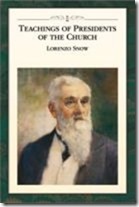Bobby recently drew to my attention a book he reviewed on Goodreads, entitled Exploring Mormon Thought by Mormon philosopher Blake Ostler. The history of Mormon publishing and commentary is both interesting and revealing and I think worth a closer look.
Mormon publishing began, of course, with the Book of Mormon. Joseph Smith said that it, “was the most correct of any book on earth, and the keystone of our religion…” In publishing terms that has to be a hard act to follow and Smith originally had no intention of following it. Indeed, by ‘revelation’ he made clear that the Book of Mormon was it.
In the 1833 Book of Commandments (the earliest version of what became the Doctrine & Covenants) the Mormon god reveals,
“…and he has a gift to translate the book [of Mormon], and I have commanded him that he shall pretend to no other gift, for I will grant him no other gift.”
By 1835 Smith had already started ‘revising’ the Bible and translating the papyrus he had bought and that he claimed was the Book of Abraham. In the ‘revised’ 1835 version of the Book of Commandments, now published as the Doctrine and Covenants, the same verses read:
“And you have a gift to translate the plates; and this is the first gift that I bestowed upon you; and I commanded that you should pretend to no other gift, until my purpose is fulfilled in this; for I will grant unto you no other gift until it is finished.”
Joseph Smith had experienced the power of publishing and learned quickly to harness it to achieve his developing ambitions. From the Book of Mormon to the early Mormon periodical Times and Seasons he set a precedent followed for the next century and more by those who came after him.
After Smith’s death Brigham Young took on the mantle of prophet, leading the saints to the Salt Lake Valley. Here he arranged to have recorded the public sermons of early prophets and apostles, though mostly of himself, recorded by a team of stenographers. The Journal of Discourses runs to 26 volumes, from Dec.1851 to August 1877. There has been nothing like it since in the Mormon Church.
Although the Church has proved a prolific publisher it has rarely added to its canon of scripture, effectively working from a closed cannon. This is something Mormons criticise Christian churches for doing. They do, however, publish teachings in books, manuals, compilations of previous prophets’ teachings, magazines, and conference reports.
What is striking for me, and this is a very personal comment, drawing from my own experience, is how the ‘authorities’ behind these publications have changed in my lifetime. When I became a Mormon in the early 1970’s most of the publications on any good Mormon’s bookshelves would have been written by General Authorities of the church.
There were, of course, tame and popular volumes like Rulon Howell’s The Mormon Story, The Restored Church, by William Bennett, and vanity published works such as Genet Bingham Dee’s A Voice From The Dust. Nevertheless, it was very much to the prophets that Mormons looked for their collateral reading of Mormon doctrine.
Talmage’s Articles of Faith, and Jesus the Christ were essential reading. Gospel Doctrine by Joseph F Smith, Doctrines of Salvation by Joseph Fielding Smith, a compilation of the Discourses of Brigham Young, and of The Teachings of the Prophet Joseph Smith sat alongside the Bible and the Book of Mormon. Even the controversial Mormon Doctrine, 80% of which was a distillation of Joseph Fielding Smith’s Doctrines of Salvation, was written by a Mormon apostle.
The reasoning was sound enough. If you are led by prophets why would you seek guidance from amateur commentators? In ministry terms too, it made no sense to challenge Mormon doctrine on the basis of unofficial statements from what are easily dismissed private interpretations.
What Blake Ostler’s book reminds me of is the departure from the way Mormon leaders of previous generations were regarded as authoritative, their publications widely quoted, their written pronouncements the final word on an issue.
Today’s Mormon world is filled with unofficial commentary on and Mormon apologetic by Mormon academics and lay people. From Stephen Robinson’s Are Mormons Christian, and Richard E Grant’s Understanding Those Other Christians, through to weightier and more academic tomes like Ostler’s, and a small library of Book of Mormon commentaries by a whole raft of unofficial commentators. This is before we begin to look at what is online today, from the more combative, panegyric sites like FAIR and SHIELD, to the more carefully academic work of FARMS at the prestigious Maxwell Institute.
As I have said, this is more a personal note, and I am sure there will be those who easily find fault. But back in the day when answering the question, “What do Mormons believe about…” the go to people were Smith (a raft of Smiths in fact), Young, Talmage, Widstoe, LeGrand Richards, Kimball and, yes, McConkie.
These days their teachings seem to be carefully selected, appropriately edited, and finally brought to the world via a correlation Committee, charged with carefully crafting the perception of Mormonism, while others, freelance you might say, fill the shelves and internet bookmarks in Mormon homes.
Prophets seem to have become little more than window dressing and I would love to read how other people see this issue. Has anyone else noticed these changes? Is anyone surprised that it has not always been the way it is today? What are the most influential unofficial works you hear quoted?
Mike Thomas was a Mormon for 14 years, became a Christian in 1986 and for many years worked with Reachout Trust speaking and writing about Mormonism. He now helps to head-up the Reachout Ministry, still researches Mormonism, delivers seminars, and occasionally posts his thoughts on Mormon issues The Mormon Chapbook

